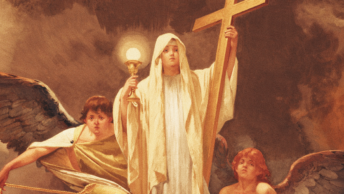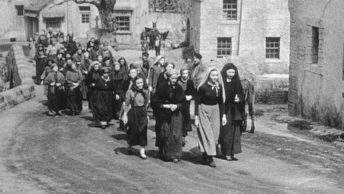It was my father’s wish to die at home. So near the end of his life we did our best to honor his wish; and ultimately that day arrived- the day that appeared to be his last day here on earth.
We all went home that morning, and gathered around my dad’s bed. I sat next to his bed, on his left side, and as I sat there, I held his wrist so I could feel his pulse. His heart was beating very slowly, only about twenty-five beats per minute. He was very weak, but he could communicate. He spoke slowly, but clearly. Then his pulse stopped. Dad’s body went limp. I continued holding his wrist and after about sixty seconds I felt his heart begin to beat again. Dad’s eyes fluttered, he reached up with both arms, like he was trying to push something out of the way. Then he lowered his arms. His heart continued to beat at that slow pace of twenty-five beats per minute for another five or ten minutes till it stopped again. And once again his heart remained silent for a minute or so till it began to beat again, and once again my dad’s eyes fluttered as he reached up with his arms.
This process of his heart beating, stopping, and beating again continued through the morning and into the afternoon. And each time my dad would reach up as he regained consciousness. Finally around mid afternoon I said to him, “Dad, every time your heart stops you lose consciousness. And every time you regain consciousness you reach up. What are you reaching for?” He looked at me and said, “That door! I’m trying to open that door. Can’t you see the door? It won’t open for me. I can’t open the door.”
With that we all left the room to talk. We all knew that it was dad’s wish to die at home, but his last statement made it clear to us that today would not be the day. So we called 911 and an ambulance arrived to take dad to the hospital. The EMS team immediately hooked dad up to a monitor and placed him on a stretcher. As they continued their preparations for the ride to the hospital, we all watched the slow heart rhythm trace across the monitor’s screen. Then the line went flat. Dad’s body went limp once again. And the man that was closest to dad bent down, putting his face right in front of my dad’s face. He began shouting out my dad’s name over and over again, calling out “Herman – Herman”. After about a minute and a half, the line on the monitor jumped, my dad’s eyes fluttered, and again he reached up. Then, as he lowered his arms, he looked around at all the faces that were looking at him till he saw mine. Then in a real clear and surprisingly loud voice he said to me, “Will you please tell him to stop shouting my name?”
Once in the hospital, they gave my dad a pacemaker to regulate the beating of his heart. The resultant increase in his strength and energy level was remarkable. My dad went on to live for another 10 years. And when that final day did arrive, my dad was at home. His passing was very peaceful. And just moments prior to his taking that last breath, he looked at me and nodded his head like he was thanking me for being there, and smiled.
Losing a loved one, as you all know, is hard. It’s difficult to accept and it’s difficult to understand. And when you find yourself in that situation, many questions cross your mind. “Is there really life on the other side of that door? And if so, what is it like? We all have similar thoughts at those most difficult times.
Well, when seeking answers to such questions, the best place to look for answers is in the Sacred Scriptures. What does the Bible have to say on the subject?
In the Old Testament, a good place to start looking is in the first and second books of Maccabees. Allow me to explain that suggestion. You see, in the late second century B.C, or about one-hundred and fifty years before the birth of our Lord, the Jews were ruled by the successors of Alexander the Great of Greece, who conquered much of the area almost two-hundred years earlier. Alexander’s goal was to control the known world. His campaigns were successful, his empire was vast, and he was a good organizer and administrator, but he died before he could complete and achieve all of his objectives. Mainly because he died so young! He died from malaria when he was only thirty-two.
The generals who took over the rule of his empire continued his objectives and his policies. One of them, Antiochus IV, had control over Palestine. However, he was emotionally unstable. He became infuriated when the Jews refused to adopt Greek culture. In an effort to force their compliance, he launched a reign of terror aimed at eradicating their religion. Obviously the Jews were terrified, but under the leadership of a family known as Maccabees, the Jews put up a valiant fight. Ultimately, the Jews were successful.
The two books of Maccabees record the history of those times. The first book of Maccabees is basically history, recording the sequence of events. The second book, communicates the feelings and emotions of the times. In chapter seven of the second book of Maccabees, there is an excellent story that addresses our question. This story is filled with emotion and drama. In the story, seven brothers and their mother are tortured and murdered, because of their refusal to break their religious laws. In this chapter, the author stresses not only the resurrection of the just, but also the power that the living have to offer prayers and sacrifice for the dead, and the power that the souls in heaven have to intercede for the people of earth. But what is most noteworthy about this story is the clear evidence of the belief that the mother and her seven sons have in the resurrection.
Another good place to look for answers to our questions is in the twentieth chapter of the Gospel of Luke. For in this chapter there is a story in which the Sadducees ask Jesus a direct and pointed question about resurrected life. In their question they remind Jesus of the Mosaic Law that says if a man dies, leaving his wife childless, his brother must take the widow as wife and raise descendents for his brother. Seven brothers marry and all seven die childless. So the Sadducees ask, when the woman herself dies, whose wife will she be in the resurrected life?
To really understand and appreciate this story, you have to understand the motives of the people who are asking the question. You see, the Sadducees were very wealthy, and nearly all of them were priests. They were the governing class. The Sadducees did accept the Torah as the inspired word of God; the Torah being the first five books of our Old Testament! But they did not accept the historical books or the prophetic books of our Old Testament. The Pharisees did accept these writings but the Sadducees did not. Consequently, the Sadducees did not believe in the resurrection from the dead because, in their opinion, there is no specific testimony to the resurrection of the dead found in the Torah.
So, in reality, when they posed this question to Jesus, they were not being sincere. The example that they used, regarding the seven brothers, was purposely meant to sound outrageously silly. Their intent was to ridicule Jesus and His teaching on the resurrection. I doubt that they sincerely expected a response from Jesus. Their unbelievable example was so extreme that it can only be seen as sarcasm and ridicule, meant to be belittling and humorous. But I would like to have seen the expression on the faces of the Sadducees when Jesus did respond, because His response was very logical. Jesus calmly points out that resurrection is not simply a continuation of this life. But rather that the resurrected life is radically different than our earthly existence.
Then as Jesus continues with His answer, He uses the same figure that they used in their question- Moses. And He uses the same books that they accept; the Torah. Jesus quotes the passage about the burning bush, which is taken directly from the Book of Exodus. And in that passage, God is called the God of Abraham, Isaac and Jacob.
But these men have all died. And Jesus concludes by saying that, “God is not the God of the dead but of the living”, testifying to the fact that these men live on.
Rather remarkable, don’t you think! Jesus gave a very logical answer to a question that was meant to be sarcastic. Jesus ignored the hypocrisy, however, and addressed the question. And His answer is fascinating. When we check the Gospels for answers to our questions about the afterlife, we discover that there are very few places in scripture where Jesus deals directly with the subject. Obviously Jesus stressed repeatedly the reality of eternal life, but rarely does He tell us what it will be like.
But I am full of questions. For example, have you ever wondered how old your resurrected body is going to be? Is it dependent on how old our body is when you leave this earth? I know that sounds like a silly question, but as silly as that question sounds, did you know that St. Augustine came up with an answer. At least an answer that satisfied him! He said we will be 33. I think his answer sounds funny but I believe he meant to be sincere. He came up with that answer because that is generally considered to be Jesus’ age at his Resurrection! I guess you can call that a logical answer to an unanswerable question!
I’m sure we all have our questions. And in this chapter from Luke’s Gospel, Jesus does provide some answers. His answers may be fascinating, but did He satisfy all our questions? No, I don’t think so! Jesus said that we will be like angels. But how can we begin to understand what it would be like to be like an angel. He said that we will rise from the dead. How can we possibly understand what it will be like to rise from the dead? He said that we will be the children of God. We know God as our Heavenly Father, but what will it be like to be a child of God in eternity? We can imagine, but we really don’t know. It all sounds great but we really don’t know.
In fact, we really don’t know much more about what the resurrected life will be like after the Lord’s answer than we did before. So based on the lack of specific details in Jesus’ answers, it would appear that He doesn’t want us to spend a lot of time thinking about it either. And this simple fact is important. Because Scripture makes it clear that our hope in the resurrection doesn’t come from knowing any of the details! Our hope in the resurrection comes from knowing Jesus, and only from knowing Jesus.
Our hope comes from our faith in the power and the love of God. We are given no specifics, no answers, no solutions, and no picture post cards. Instead we are called to surrender our curiosities and trust solely on the love of God. So when we search the Scriptures for specific answers to our questions, we find that scripture does not reveal very many details. We may not understand the reason for the absence of information, but the reason for this omission is found in Scripture. Paul tells us in his first Letter to the Corinthians (2:9) that, “Eye has not seen, ear has not heard, nor has it so much as dawned on man, what God has prepared for those who love Him.”
The specifics of eternal life are beyond our comprehension. But what we do know, based on Jesus’ own words, is that we will live forever, our bodies will be resurrected, God’s love will never die and we will live in the light of God’s love for all eternity. The lesson that we learn by searching the scriptures is that we all must learn to let go of our need for earthly proof and learn to trust in the love and plan of God.








